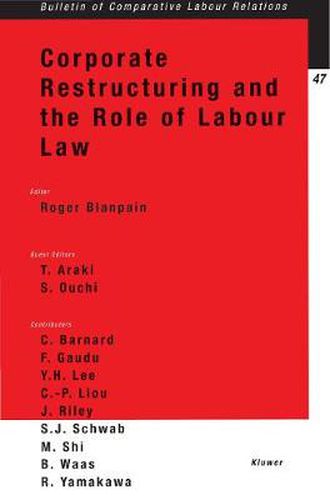Readings Newsletter
Become a Readings Member to make your shopping experience even easier.
Sign in or sign up for free!
You’re not far away from qualifying for FREE standard shipping within Australia
You’ve qualified for FREE standard shipping within Australia
The cart is loading…






This title is printed to order. This book may have been self-published. If so, we cannot guarantee the quality of the content. In the main most books will have gone through the editing process however some may not. We therefore suggest that you be aware of this before ordering this book. If in doubt check either the author or publisher’s details as we are unable to accept any returns unless they are faulty. Please contact us if you have any questions.
This bulletin presents a comparative analysis of the degree of worker protection available in various countries in the event of corporate restructuring. The countries are France, Germany, the United Kingdom, the United States, Australia, China, Japan, Korea, and Taiwan. Each of the papers, presented by a noted industrial relations scholar from the country in question, proceeds from a summary of the national legal framework governing corporate restructuring, through the succession of employment contracts, to an analysis of such major components of the problem as justification of economic dismissals and changes in terms and conditions of employment. Specific topics covered in each analysis include the following: special legislation covering transfer of undertakings; treatment of insolvent corporations; economic dismissals before and after corporate restructuring; transfer of workers in lieu of dismissal; and the role of labour unions and works councils. The authors pay particular attention to the effectiveness of employee protection legislation such as the EC Transfer of Undertaking Directive (and its implementation by Member States) and Japan’s Labour Contract Succession Law - and, in the case of the United States, the virtual absence of such legislation. These papers were originally presented at the Sixth Tokyo Seminar (March 2002) of the Japan Institute of Labour.
$9.00 standard shipping within Australia
FREE standard shipping within Australia for orders over $100.00
Express & International shipping calculated at checkout
This title is printed to order. This book may have been self-published. If so, we cannot guarantee the quality of the content. In the main most books will have gone through the editing process however some may not. We therefore suggest that you be aware of this before ordering this book. If in doubt check either the author or publisher’s details as we are unable to accept any returns unless they are faulty. Please contact us if you have any questions.
This bulletin presents a comparative analysis of the degree of worker protection available in various countries in the event of corporate restructuring. The countries are France, Germany, the United Kingdom, the United States, Australia, China, Japan, Korea, and Taiwan. Each of the papers, presented by a noted industrial relations scholar from the country in question, proceeds from a summary of the national legal framework governing corporate restructuring, through the succession of employment contracts, to an analysis of such major components of the problem as justification of economic dismissals and changes in terms and conditions of employment. Specific topics covered in each analysis include the following: special legislation covering transfer of undertakings; treatment of insolvent corporations; economic dismissals before and after corporate restructuring; transfer of workers in lieu of dismissal; and the role of labour unions and works councils. The authors pay particular attention to the effectiveness of employee protection legislation such as the EC Transfer of Undertaking Directive (and its implementation by Member States) and Japan’s Labour Contract Succession Law - and, in the case of the United States, the virtual absence of such legislation. These papers were originally presented at the Sixth Tokyo Seminar (March 2002) of the Japan Institute of Labour.